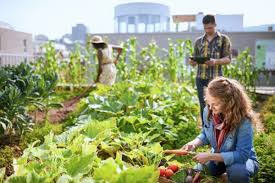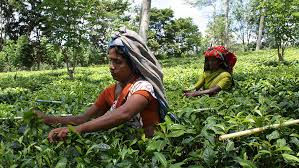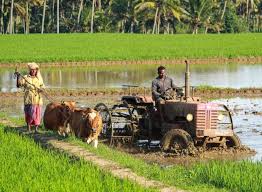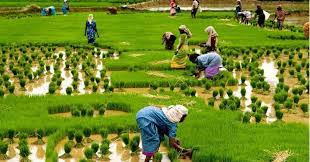Role of Agriculture in the Economy is both foundational and multifaceted, impacting various aspects of national and global development. Agriculture is a primary source of income, food, and employment for millions of people worldwide, particularly in developing countries where it often serves as the economic backbone.
This sector significantly contributes to Gross Domestic Product (GDP), foreign exchange, and poverty alleviation by generating jobs across farming, processing, and distribution. Even in more industrialized nations, agriculture remains essential, providing food security and raw materials that support numerous industries.
Beyond food production, agriculture stimulates economic growth by creating job opportunities, which helps reduce poverty and improve living standards. Technological advancements in agriculture, such as improved farming techniques and equipment, have led to increased productivity, enabling countries to become more self-sufficient and competitive in the global market.
Additionally, agriculture’s influence extends to other sectors, such as manufacturing, transportation, and retail, as these industries rely on agricultural output for raw materials and goods to process, distribute, and sell.
Moreover, agriculture plays a vital role in sustaining rural economies. In regions where farming is the primary occupation, agriculture not only supports local businesses but also fosters infrastructure development, community stability, and a sustainable environment.
This sector’s economic benefits are far-reaching, ensuring food security, keeping food prices stable, and promoting responsible land use. Thus, the role of agriculture in the economy is fundamental not only for its direct contributions but also for its broader impact on societal development and sustainability.
Contribution of Agriculture to GDP
1. Economic Foundation: Agriculture is a vital sector that contributes significantly to a country’s Gross Domestic Product (GDP). In many developing nations, it can account for a substantial portion of total GDP, underscoring its role in economic stability.
2. Value Addition: Beyond raw food production, agriculture adds value through processing, packaging, and distribution. This transformation enhances the economic impact of the sector and creates additional revenue streams.
3. Growth Potential: Investment in agriculture can stimulate overall economic growth. By improving productivity and efficiency in agricultural practices, countries can boost their GDP and foster rural development.
Employment Opportunities in Agriculture

1. Job Creation: Agriculture is a major source of employment, especially in rural areas where other job opportunities may be limited. It provides jobs not only in farming but also in processing, distribution, and retail.
2. Diverse Roles: The agricultural sector offers a variety of employment opportunities, from manual labor to skilled positions in agronomy, veterinary services, and agricultural engineering.
3. Youth Engagement: Encouraging youth involvement in agriculture can help address unemployment issues and bring innovation to the sector. Programs that support education and entrepreneurship in agriculture can create a sustainable workforce.
Agriculture and Food Security
1. Food Production: Agriculture is essential for producing the food necessary to sustain the growing global population. A stable agricultural sector ensures a consistent food supply.
2. Nutritional Security: Beyond quantity, agriculture plays a key role in providing diverse and nutritious food options. Sustainable agricultural practices can enhance food quality and nutritional value.
3. Resilience to Crises: Strong agricultural systems contribute to food security by being resilient to environmental shocks, market fluctuations, and geopolitical tensions. Policies that support sustainable practices can bolster this resilience.
Agriculture’s Impact on Trade and Exports
1. Global Trade Dynamics: Agriculture is a significant component of international trade. Many countries depend on agricultural exports for foreign exchange, affecting their economic health and trade balance.
2. Export Potential: Agricultural products, including grains, fruits, vegetables, and livestock, are key export commodities. Countries with robust agricultural sectors can benefit from favorable trade agreements and market access.
3. Economic Development: Agricultural exports can drive economic development by generating income, creating jobs, and attracting investment. Promoting competitive agricultural practices can enhance a country’s position in global markets.
Read Also: Foot-and-mouth Disease (FMD): Description, Damages Caused, Control and Preventive Measures
The Role of Agriculture in Rural Development

1. Livelihood Generation: Agriculture is the primary source of income for many rural households. By providing jobs and income opportunities, it helps reduce poverty and improve living standards in rural communities.
2. Infrastructure Development: Agricultural activities can drive the development of infrastructure, such as roads, irrigation systems, and storage facilities. Improved infrastructure benefits not only farmers but also enhances access to markets and services for the entire community.
3. Community Engagement: Agriculture fosters community engagement and social cohesion. Cooperative farming and local markets encourage collaboration among farmers, strengthening community ties and enhancing social networks.
Environmental Sustainability and Agriculture
1. Sustainable Practices: Agriculture can promote environmental sustainability through practices that preserve natural resources. Techniques such as crop rotation, organic farming, and agroforestry contribute to soil health and biodiversity.
2. Resource Conservation: Sustainable agricultural practices help conserve water, reduce soil erosion, and enhance carbon sequestration. This is crucial in mitigating the impacts of climate change and preserving ecosystems.
3. Ecosystem Services: Agriculture can provide essential ecosystem services, such as pollination, pest control, and nutrient cycling. These services are vital for maintaining the health of agricultural landscapes and supporting biodiversity.
Challenges Facing the Agricultural Sector
1. Climate Change: Agriculture is highly vulnerable to climate change, which can lead to unpredictable weather patterns, reduced crop yields, and increased pest and disease pressures. Adaptation strategies are essential for mitigating these impacts.
2. Land Degradation: Unsustainable farming practices can result in soil degradation, deforestation, and loss of biodiversity. Addressing these issues requires a shift towards more sustainable land management practices.
3. Market Access: Many smallholder farmers face challenges in accessing markets due to inadequate infrastructure, high transportation costs, and lack of information. Improving market access is vital for enhancing farmers’ incomes and livelihoods.
Read Also: Which Herbs and Spices are good for you (cinnamon, paprika, etc)
Future Prospects for Agriculture in the Economy

1. Technological Advancements: The adoption of innovative technologies, such as precision agriculture and digital farming tools, has the potential to increase productivity and efficiency in the agricultural sector. Embracing these advancements can lead to significant economic growth.
2. Global Demand for Food: As the global population continues to rise, the demand for food will increase. This presents an opportunity for the agricultural sector to expand and diversify its production to meet consumer needs.
3. Policy Support: Supportive government policies and investment in agricultural research and development can enhance the resilience and competitiveness of the agricultural sector. Fostering an enabling environment will be crucial for achieving sustainable agricultural growth.
Agriculture is a key driver of rural development, contributing to livelihoods, infrastructure, and environmental sustainability. While challenges exist, the future prospects for agriculture remain promising with the right investments, technologies, and policies in place.
Ensuring the sustainability and growth of the agricultural sector will be essential for fostering economic development and improving the quality of life in rural areas.
Agriculture is a fundamental aspect of economic development and societal well-being. Its contributions to GDP, employment, food security, and trade are critical for ensuring a sustainable future.
As global challenges continue to evolve, prioritizing agriculture will be essential for fostering economic growth and ensuring food availability for all.
Do you have any questions, suggestions, or contributions? If so, please feel free to use the comment box below to share your thoughts. We also encourage you to kindly share this information with others who might benefit from it. Since we can’t reach everyone at once, we truly appreciate your help in spreading the word. Thank you so much for your support and for sharing!
Read Also: Tips for Maintaining a Clean Garbage Disposal
Frequently Asked Questions
We will update this section soon.

